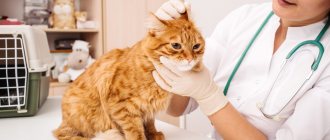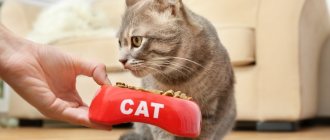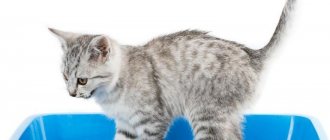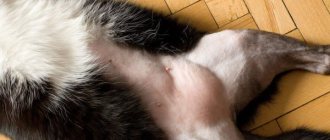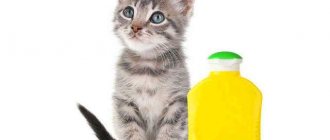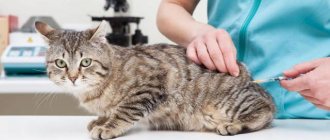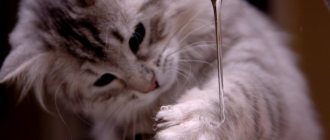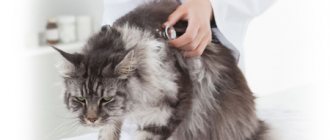A kitten's severely swollen belly is often a symptom of a dangerous disease, the untimely treatment of which can lead to dire consequences. But the reason for this pathological condition lies in other disorders. Therefore, if the owner notices that the cat has an unnaturally enlarged belly, the pet is not eating well, is lethargic, or cannot go to the toilet on its own, it is better not to hesitate to visit the veterinarian.
Main reasons
Frequent constipation
Often a baby’s round, bloated tummy is a consequence of problems with bowel movements. Constipation is often caused by such common diseases in cats as dysbacteriosis, helminthiasis, and disruption of the gastrointestinal tract. In addition, cats often have stomach pain and are unable to go to the litter box due to stress. The absence of bowel movements for 2-3 days should be a cause for concern and an urgent visit to the hospital.
Poor nutrition
This is often the reason why a kitten has diarrhea and a bloated belly. As soon as a kitten appears in the house, the owner needs to think about quality nutrition and, if necessary, seek advice from a veterinarian. Balanced, healthy food is the key to proper growth, development and activity of the cat. It is necessary to refuse food from the human table, use high-quality factory food instead, or prepare special dishes for your baby that his body will digest without problems.
It is important to prevent your kitten from overeating. Due to excessive consumption of food, the stomach not only swells, but also causes increased gas formation, bloating, and colic.
Gases in the intestines
Gas formation is a consequence of the proliferation of worms, which leads to emaciation of the pet.
If the kitten has a large belly, loose stools, and is constantly bothered by intestinal gases, most likely the cause of this condition is a helminthic infestation. If the number of worms constantly increases, the baby becomes thin, and his appetite is increased, but it may also be reduced. When worms are actively breeding, the tummy is tight and inflated. Sometimes a lump of parasites comes out along with the feces. It is necessary to select an antihelminthic medicine for your pet as soon as possible, because gases in this case are not the biggest problem. Untimely treatment of the animal leads to its death.
Binge eating
A kitten, accustomed to eating more than moderation, soon becomes fat, and excess weight negatively affects the health of the animal, especially if it has a tendency to congenital heart diseases. In addition, the digestive system cannot always cope with large volumes of food entering the stomach and intestines. As a result, food begins to rot and ferment inside, the kitten's tummy swells, and bloating is often accompanied by pain and discomfort.
Worm infestation
A common cause of cramps and flatulence in cats and kittens. A swollen, tense and enlarged abdomen indicates that there are a lot of parasites in the intestines. A worm that has grown to a large size injures the intestinal mucosa and leads to disruption of its functioning. Therefore, if the kitten has a hard belly and there are all signs of infection, you need to urgently visit a doctor and find the appropriate therapy.
Diseases
An enlarged abdomen, which takes the shape of a pear, indicates a disease such as abdominal dropsy.
Often the reason that a cat has a big belly is various internal diseases, among which the following are common:
- Abdominal dropsy. With this pathology, the kitten's tummy is enlarged at the bottom. If you lift the baby, you will notice that the abdomen is shaped like a pear. Bloating is often accompanied by rumbling, intestinal upset, and pain.
- Liver diseases. With hepatitis, in addition to the fact that the stomach is swollen, the whites of the eyes and the oral mucosa are yellow. There is an increase in body temperature, while the nose is hot and dry. If cirrhosis develops, the kitten is constantly swollen and the belly is very distended. The baby refuses to eat and quickly loses weight.
- Gastrointestinal cancer. It is more often diagnosed in adults, but small kittens are not immune from cancer. In addition to the fact that the cat has a dense stomach, symptoms such as pain, indigestion, and intestinal upset are disturbing. Often, swellings appear under the jaw, which are enlarged lymph nodes. The animal is lethargic, loses appetite and weight.
- Infectious peritonitis. This is a dangerous disease in which infectious inflammation of the abdominal organs occurs. In addition to the fact that the abdomen is tense, swollen and elastic, the animal is worried about severe diarrhea, vomiting, fever, and a critical increase in body temperature.
- Pancreatitis. When the pancreas is inflamed, it is noticeable that the pet’s tummy is hard, very swollen, and painful.
Pregnancy
In the case of free access to the street, pregnancy may be the reason for the roundness of the pet.
If at the age of 6-9 months the owner notices a large belly in the cat, there is a high probability that the pet has become pregnant. Most often, this situation occurs when an animal freely visits the street. If the owner does not plan to breed offspring, it is advisable to sterilize the animal before the first heat. A sterilized cat has fewer health problems, and the owner does not need to worry about what to do with the animal during sexual “hunting.”
If your cat has a hard belly rather than a soft belly
Anyone who owns a cat is well aware that a cat has a particularly soft part of its body: its belly, which is unsurprisingly called “soft.” Some also call it a "pouch". This area of the body is nothing more than a growth that cats have in the lower abdomen. Although a cat's body is inherently elegant, agile and fit, this area always remains the softest and most saggy: this is not a disease or a malformation.
When a cat undergoes spay surgery, the empty space in the gonads or ovaries causes a hormonal decline. This way the tissues relax and the stomach appears softer. Of course, this is not the fat that remains attached to your belly after a serious diet. But then why can a cat have a hard and often swollen belly? Answers in the next paragraph.
© shutterstock
Diagnostics
If your cat has a swollen belly and is also bothered by accompanying pathological symptoms, you should urgently take the animal to the veterinarian. During the initial examination, the doctor will try to find out why the tummy is swollen and bloated. To confirm the diagnosis, the doctor will give a referral for laboratory tests of stool and blood. If internal diseases are suspected, he will prescribe an ultrasound and x-ray. As soon as the exact diagnosis becomes known, the veterinarian will select a treatment regimen that will help solve the problem.
In what cases should you contact a veterinarian?
The most dangerous causes of an enlarged abdomen in a kitten are peritonitis and ascites. Without timely veterinary care, the pet may even die. How to recognize these dangerous pathologies:
- Peritonitis is an inflammation of the abdominal cavity of an animal. It is necessarily accompanied by the following symptoms: elevated body temperature; vomiting; refusal of food; weakness; apathy.
- Ascites is the formation of excess fluid in the abdominal cavity without the presence of an inflammatory process. It is worth noting that the kitten itself can be thin, and the circumference of the abdomen stands out sharply against the general background. If the owner lifts the kitten, holding it under his front paws, the baby’s belly will “fall”, forming a pear shape.
Peritonitis and ascites are life-threatening conditions, so you need to take the kitten to the vet as soon as possible. Only a specialist can treat these pathologies, and sometimes even minutes count.
What to do to eliminate the pathology?
If the cause of bloating is constipation, then the drug Duphalac will help to cope with the problem.
If the kitten's sides are swollen due to a severe internal illness, the doctor will hospitalize the pet and, if necessary, perform surgery. In other cases, you can deal with the problem at home. For constipation, you can give your pet the drug Duphalac and use microenemas. Vaseline oil will help improve digestion; its dosage is 0.1 ml per 100 g of weight. It is recommended to give the product 2-3 times a day.
If the cat's swollen sides are a sign of helminthic infestation, in this situation antihelminthics will help normalize the condition. Doctors at the Zoovet clinic point out that not every drug is intended for kittens aged 2-3 months. Therefore, the veterinarian must select the medicine, taking into account the baby’s age, the degree of invasion and other individual characteristics.
After giving birth, the cat's abdomen will return to its normal position without special treatment. The problem of overeating is easy to eliminate. Often, increased appetite is associated with a lack of vitamins and other elements in the body. Therefore, it is better to feed your cat with ready-made food, where all the ingredients are balanced and selected for a certain age.
Symptoms indicating illness
In addition to the duration of the bloating, it is important to consider any warning signs. Possible pathology is indicated by:
inflammation, yellowing or blue discoloration of mucous membranes;
too rapid enlargement of the peritoneum or sudden weight loss;
frequent vomiting, diarrhea, or lack of bowel movements for more than 2 days in a row;
lethargy and fever;
pain when emptying the bowel or bladder;
dullness and hair loss;
foam, blood or parasites found in vomit and feces;
increased thirst and loss of appetite;
severe pain in the abdominal area upon palpation.
If a pregnant cat's swollen belly does not return to normal within 1.5 days after birth, call a veterinarian. This condition is typical for unfinished labor. The stuck fetus will have to be removed surgically.
Treatment
Constipation, intestinal obstruction
If peristalsis decreases, treatment involves adjusting the diet. For constipation, antispasmodics and laxatives (for example, lactulose) are prescribed.
In case of partial obstruction, symptomatic therapy is carried out (droppers, antiemetics, painkillers). If the obstruction does not resolve, the problem is solved surgically.
Gastrointestinal diseases
As a rule, the diet is prescribed first. Depending on the location of the inflammation and its cause, the following may be prescribed: antibiotics, painkillers, antiemetics, gastroprotectors, prebiotics, droppers, anthelmintic drugs.
Helminths
Kittens, regardless of the size of their bellies, need to be treated for parasites every 1.5-2 months. If there are symptoms of helminthic infestation (worms in stool, vomit), then treatment should be carried out in therapeutic dosages, which will be individually calculated by the doctor at the appointment.
Flatulence
A kitten may have gas due to improper feeding. Treatment consists of dietary adjustments, abdominal massage and the use of carminatives.
Ascites
Treatment for ascites depends on its cause, but it is always an alarming symptom.
For viral peritonitis, the prognosis is cautious. In recent years, there is information about treatment with an antiviral drug from humane medicine (GS), which shows high effectiveness. But there are still few studies, and the drug is difficult to use due to its high price and dosage regimen. Antivirals from a regular pharmacy in the form of tablets (acyclovir, etc.) not only will not help in treatment, but can be dangerous for cats.
If the cause of ascites is diseases of the internal organs, droppers, intravenous albumin, tonics, hepatoprotectors, and antibiotics may be required.
If there is a large accumulation of fluid, it is aspirated (pumped out).
Liver diseases
For liver diseases, hepatoprotectors and symptomatic treatment (antiemetics, antispasmodics) are first prescribed. After diagnosis, antimicrobial, choleretic drugs, diet, and drip infusions may be recommended. Sometimes surgery is required.
Urinary retention
Treatment of acute urinary retention can only be provided in a clinic. To drain urine, a urethral catheter is installed or cystocentesis is performed (a puncture through the abdominal wall).
Depending on the cause of urinary retention, the following are prescribed: pain relief, diet, antibiotics, drip infusions, drinking regimen, supplements. If large uroliths form or there is an abnormality in the structure of the urinary system, surgery will be required.
Uterine diseases
Conservative treatment of uterine diseases in cats has been developed, but only shows its effectiveness with early diagnosis. In addition, the risk of relapse in the next heat remains. Therefore, sterilization (OGE) is done much more often. In this operation, the uterus and ovaries are removed.
Polycystic disease and neoplasms
Neoplasms of almost any nature are recommended to be removed and sent to the laboratory. Based on the histology results, chemotherapy may be prescribed. Cysts, as a rule, appear again even after removal. Their effective treatment has not been developed. Symptomatic therapy is used, and regular examinations and ultrasounds are performed to monitor the size of the cysts.
Prevention
Balanced diet
To prevent flatulence, constipation and dynamic intestinal obstruction, first of all, it is important to feed the kitten correctly. The correct ratio of proteins, fats and carbohydrates is only a small requirement for a balanced diet. No less important is the content of fiber, vitamins, and microelements. If you are feeding your baby food, then simply select the diet according to age and breed. However, if you feed your pet a natural diet, it is important to balance all the nutrients, and a nutritionist will help you with this.
Regular treatments for parasites
As we discussed earlier, deworming in kittens should be done once every 1.5-2 months. But there is not a single drug that acts on absolutely all parasites, so it is recommended to change the drug every 1-2 treatments in order to cover a wider range of pathogens.
Sterilization
If you are not planning kittens, then it is best to carry out routine sterilization. Cats undergo such operations from 4 months. This will protect against the appearance of cysts on the uterus and ovaries, and early castration (from 4 to 8 months) prevents the formation of mammary gland tumors.
Limiting contact with sick animals
Ascites often occurs due to the peritonitis virus. The only way to prevent infection is to prevent your pet from coming into contact with sick and potentially dangerous animals. Don't let him outside unattended. Quarantine for at least 2 weeks when getting new animals.

